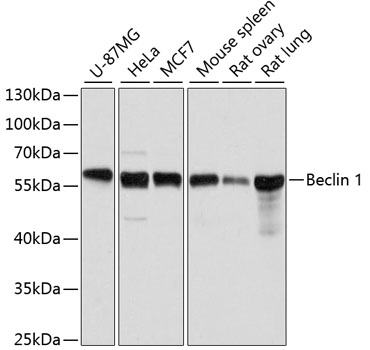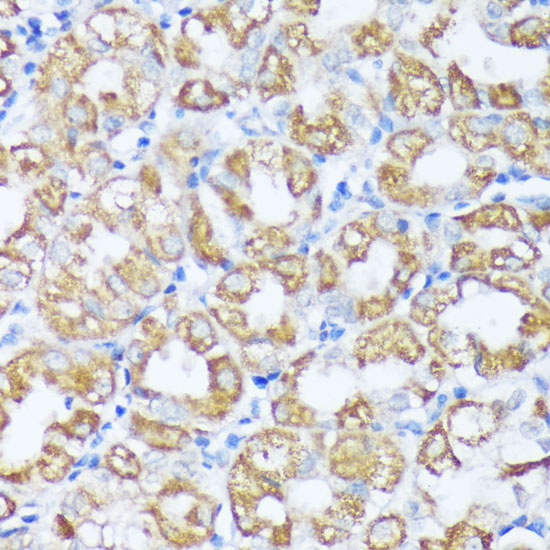Product Name :
Beclin 1 polyclonal antibody Background :
This gene encodes a protein that regulates autophagy, a catabolic process of degradation induced by starvation. The encoded protein is a component of the phosphatidylinositol-3-kinase (PI3K) complex which mediates vesicle-trafficking processes. This protein is thought to play a role in multiple cellular processes, including tumorigenesis, neurodegeneration and apoptosis. Alternative splicing results in multiple transcript variants. Product :
1mg/ml in PBS with 0.02% sodium azide, 50% glycerol, pH7.2 Storage&Stability :
Store at 4°C short term. Aliquot and store at -20°C long term. Avoid freeze-thaw cycles. Specificity :
Polyclonal Antibodies Immunogen :
Recombinant fusion protein of human Beclin 1(NP_003757.1). Conjugate :
Unconjugated Modification :
Unmodified
Beclin 1 polyclonal antibody Background :
This gene encodes a protein that regulates autophagy, a catabolic process of degradation induced by starvation. The encoded protein is a component of the phosphatidylinositol-3-kinase (PI3K) complex which mediates vesicle-trafficking processes. This protein is thought to play a role in multiple cellular processes, including tumorigenesis, neurodegeneration and apoptosis. Alternative splicing results in multiple transcript variants. Product :
1mg/ml in PBS with 0.02% sodium azide, 50% glycerol, pH7.2 Storage&Stability :
Store at 4°C short term. Aliquot and store at -20°C long term. Avoid freeze-thaw cycles. Specificity :
Polyclonal Antibodies Immunogen :
Recombinant fusion protein of human Beclin 1(NP_003757.1). Conjugate :
Unconjugated Modification :
Unmodified
-
 Western blot (WB) analysis of Beclin 1 polyclonal antibody at 1:1000 dillution Lane1:U-87MG whole cell lysate(40μg) Lane2:MCF-7 whole cell lysate(40μg) Lane3:CT26 whole cell lysate(40μg) Lane4:PC12 whole cell lysate(40μg)
Western blot (WB) analysis of Beclin 1 polyclonal antibody at 1:1000 dillution Lane1:U-87MG whole cell lysate(40μg) Lane2:MCF-7 whole cell lysate(40μg) Lane3:CT26 whole cell lysate(40μg) Lane4:PC12 whole cell lysate(40μg) -
 Immunofluorescence analysis of U-87MG cells using Beclin 1 antibody at dilution of 1:50.
Immunofluorescence analysis of U-87MG cells using Beclin 1 antibody at dilution of 1:50.
PPARγ Maintains Homeostasis through Autophagy Regulation in Dental Pulp.
PMCID: Pubmed No.:25744070
Potent effects of dioscin against hepatocellular carcinoma through regulating TP53‐induced glycolysis and apoptosis regulator (TIGAR)‐mediated apoptosis, autophagy, and DNA damage
PMCID: Pubmed No.:30710454
Transcriptome-Based Network Analysis Reveals Hirudin Potentiates Anti-Renal Fibrosis Efficacy in UUO Rats
PMCID: Pubmed No.:34621173
IL-33/ST2L Signaling Provides Neuroprotection Through Inhibiting Autophagy, Endoplasmic Reticulum Stress, and Apoptosis in a Mouse Model of Traumatic Brain Injury
PMCID: Pubmed No.:29922130
Proteomes analysis reveals the involvement of autophagy in AD-like neuropathology induced by noise exposure and ApoE4
PMCID: Pubmed No.:31228807
TSPAN9 suppresses the chemosensitivity of gastric cancer to 5-fluorouracil by promoting autophagy
PMCID: Pubmed No.:31911756
Apoptosis Induction by Iron Radiation via Inhibition of Autophagy in Trp53+/-Mouse Testes: Is Chronic Restraint-Induced Stress a Modifying Factor?
PMCID: Pubmed No.:29989073
IL-33 Alleviated Brain Damage via Anti-apoptosis, Endoplasmic Reticulum Stress, and Inflammation After Epilepsy.
PMCID: Pubmed No.:32982679
Glucagon-like peptide-1/glucose-dependent insulinotropic polypeptide dual receptor agonist DA-CH5 is superior to exendin-4 in protecting neurons in the 6-hydroxydopamine rat Parkinson model
PMCID: Pubmed No.:33433498
Dynamin-Related Protein 1 Is Involved in Mitochondrial Damage, Defective Mitophagy, and NLRP3 Inflammasome Activation Induced by MSU Crystals
PMCID: Pubmed No.:36338340
Melatonin protects oocytes from cadmium exposure-induced meiosis defects by changing epigenetic modification and enhancing mitochondrial morphology in the mouse
PMCID: Pubmed No.:36410142
Hesperidin Reversed Long-Term N-methyl-N-nitro-N-Nitroguanidine Exposure Induced EMT and Cell Proliferation by Activating Autophagy in Gastric Tissues of Rats
PMCID: Pubmed No.:36558440
m6A-Mediated PPARA Translational Suppression Contributes to Corticosterone-Induced Visceral Fat Deposition in Chickens
PMCID: Pubmed No.:36555401
MicroRNA-129-1-3p attenuates autophagy-dependent cell death by targeting MCU in granulosa cells of laying hens under H2O2-induced oxidative stress
PMCID: Pubmed No.:37595500
Bioworld Biotech only provide peptides for our antibodies and do not provide additional peptide customization services.
Price/Size :
USD 368/1mg/vial
Tips:
For phospho antibody, we provide phospho peptide(0.5mg) and non-phospho peptide(0.5mg).Describe :
Blocking peptides are peptides that bind specifically to the target antibody and block antibody binding. These peptide usually contains the epitope recognized by the antibody. Antibodies bound to the blocking peptide no longer bind to the epitope on the target protein. This mechanism is useful when non-specific binding is an issue, for example, in Western blotting (WB) and Immunohistochemistry (IHC). By comparing the staining from the blocked antibody versus the antibody alone, one can see which staining is specific; Specific binding will be absent from the western blot or IHC performed with the neutralized antibody.Formula:
Synthetic peptide was lyophilized with 100% acetonitrile and is supplied as a powder. Reconstitute with 0.1 ml DI water for a final concentration of 10 mg/ml.The purity is >90%,tested by HPLC and MS.
Storage:
The freeze-dried powder is more stable. For short time at 2-8°C. For long term storage store at -20°C.
Note :
This product is for research use only (RUO only). Not for use in diagnostic or therapeutic procedures.
 Beclin 1 polyclonal antibody
Beclin 1 polyclonal antibody  Datasheet
Datasheet COA
COA MSDS
MSDS SHIP
SHIP